North Carolina Tar Heels men's basketball
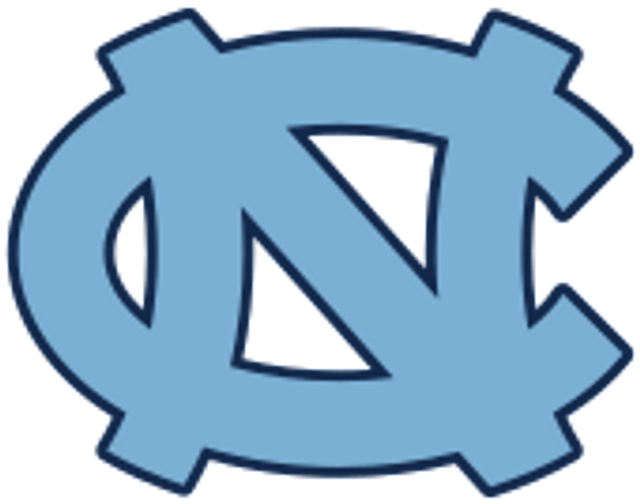
North Carolina Tar Heels men's basketball

| North Carolina Tar Heels | |||
|---|---|---|---|
| |||
| University | University of North Carolina at Chapel Hill | ||
| First season | 1910 | ||
| All-time record | 2261–799 (.739) | ||
| Athletic director | Bubba Cunningham | ||
| Head coach | Roy Williams(17th season) | ||
| Conference | Atlantic Coast Conference | ||
| Location | Chapel Hill, North Carolina | ||
| Arena | Dean Smith Center (Capacity: 21,750) | ||
| Nickname | Tar Heels | ||
| Colors | Carolina Blue and White[1] | ||
| Uniforms | |||
| |||
| Pre-tournament Premo-Porretta Champions | |||
| 1924 | |||
| Pre-tournament Helms Champions | |||
| 1924 | |||
| NCAA Tournament Champions | |||
| 1957, 1982, 1993, 2005, 2009, 2017 | |||
| NCAA Tournament Runner-up | |||
| 1946, 1968, 1977, 1981, 2016 | |||
| NCAA Tournament Final Four | |||
| 1946, 1957, 1967, 1968, 1969, 1972, 1977, 1981, 1982, 1991, 1993, 1995, 1997, 1998, 2000, 2005, 2008, 2009, 2016, 2017 | |||
| NCAA Tournament Elite Eight | |||
| 1941, 1946, 1957, 1967, 1968, 1969, 1972, 1977, 1981, 1982, 1983, 1985, 1987, 1988, 1991, 1993, 1995, 1997, 1998, 2000, 2005, 2007, 2008, 2009, 2011, 2012, 2016, 2017 | |||
| NCAA Tournament Sweet Sixteen | |||
| 1957, 1967, 1968, 1969, 1972, 1975, 1977, 1981, 1982, 1983, 1984, 1985, 1986, 1987, 1988, 1989, 1990, 1991, 1992, 1993, 1995, 1997, 1998, 2000, 2005, 2007, 2008, 2009, 2011, 2012, 2015, 2016, 2017, 2019 | |||
| NCAA Tournament Appearances | |||
| 1941, 1946, 1957, 1959, 1967, 1968, 1969, 1972, 1975, 1976, 1977, 1978, 1979, 1980, 1981, 1982, 1983, 1984, 1985, 1986, 1987, 1988, 1989, 1990, 1991, 1992, 1993, 1994, 1995, 1996, 1997, 1998, 1999, 2000, 2001, 2004, 2005, 2006, 2007, 2008, 2009, 2011, 2012, 2013, 2014, 2015, 2016, 2017, 2018, 2019 | |||
| Conference Tournament Champions | |||
| 1922, 1924, 1925, 1926, 1935, 1936, 1940, 1945, 1957, 1967, 1968, 1969, 1972, 1975, 1977, 1979, 1981, 1982, 1989, 1991, 1994, 1997, 1998, 2007, 2008, 2016 | |||
| Conference Regular Season Champions | |||
| 1923, 1924, 1925, 1926, 1935, 1938, 1941, 1944, 1946, 1956, 1957, 1959, 1960, 1961, 1967, 1968, 1969, 1971, 1972, 1976, 1977, 1978, 1979, 1982, 1983, 1984, 1985, 1987, 1988, 1993, 1995, 2001, 2005, 2007, 2008, 2009, 2011, 2012, 2016, 2017, 2019 | |||
The North Carolina Tar Heels men's basketball program is the intercollegiate men's basketball team of the University of North Carolina at Chapel Hill. The Tar Heels have won seven NCAA men's college national championships (1924, 1957, 1982, 1993, 2005, 2009, and 2017).[2] North Carolina's six NCAA Tournament Championships are third-most all-time, behind University of California, Los Angeles(11) and University of Kentucky(8). They have also won 18 Atlantic Coast Conference tournament titles,[3] 32 Atlantic Coast Conference regular season titles,[4] and an Atlantic Coast Conference record 20 outright Regular Season Championships.[4] The program has produced many notable players who went on to play in the NBA, including three of the 50 Greatest Players in NBA History: Billy Cunningham, Michael Jordan and James Worthy. Many Tar Heel assistant coaches have gone on to become head coaches elsewhere.[5]
From the Tar Heels' first season in 1910–11 through the 2017–18 season, the program has amassed a .738 all-time winning percentage (second highest all-time), winning 2,232 games and losing 792 games in 108 seasons.[6][7][8] The Tar Heels also have the most consecutive 20-win seasons with 31 seasons from the 1970–71 season through the 2000–2001 season.[9] On March 2, 2010, North Carolina became the second college basketball program to reach 2,000 wins in its history. The Tar Heels are currently ranked 3rd all time in wins trailing Kentucky by 31 games and Kansas by 16 games. The Tar Heels are one of only four Division I Men's Basketball programs to have ever achieved 2,000 victories. Kentucky, Kansas, and Duke are the other three. North Carolina has averaged more wins per season played than any other program in college basketball.
Carolina has played 160 games in the NCAA tournament. The Tar Heels have appeared in the NCAA Tournament Championship Game 11 times, and have been in a record 20 NCAA Tournament Final Fours.[10] The Tar Heels have made it into the NCAA tournament 50 times (second-most all-time),[11][12] and have amassed 123 victories (second most all-time).[11][12] North Carolina also won the National Invitation Tournament in 1971,[3] and appeared in two NIT Finals with six appearances in the NIT Tournament.[3] Additionally, the team has been the number one seed in the NCAA Tournament 17 times, the latest being in 2019 (most #1 seeds all-time).
North Carolina has been ranked in the Top 25 in the AP Poll an all-time record 908 weeks,[13] has beaten #1 ranked teams a record 14 times,[14] has the most consecutive 20-win seasons with 31,[15] and the most consecutive top-3 ACC regular season finishes with 37.[15] North Carolina has ended the season ranked in the Top-25 of the AP Poll 50 times and in the Top-25 of the Coaches' Poll 52 times. Further, the Tar Heels have finished the season ranked #1 in the AP Poll 5 times and ranked #1 in Coaches' Poll 6 times. In 2008, the Tar Heels received the first unanimous preseason #1 ranking in the history of either the Coaches' Poll[16] or the AP Poll.[17] In 2012, ESPN ranked North Carolina #1 on its list of the 50 most successful programs of the past 50 years.[18]
| North Carolina Tar Heels | |||
|---|---|---|---|
| |||
| University | University of North Carolina at Chapel Hill | ||
| First season | 1910 | ||
| All-time record | 2261–799 (.739) | ||
| Athletic director | Bubba Cunningham | ||
| Head coach | Roy Williams(17th season) | ||
| Conference | Atlantic Coast Conference | ||
| Location | Chapel Hill, North Carolina | ||
| Arena | Dean Smith Center (Capacity: 21,750) | ||
| Nickname | Tar Heels | ||
| Colors | Carolina Blue and White[1] | ||
| Uniforms | |||
| |||
| Pre-tournament Premo-Porretta Champions | |||
| 1924 | |||
| Pre-tournament Helms Champions | |||
| 1924 | |||
| NCAA Tournament Champions | |||
| 1957, 1982, 1993, 2005, 2009, 2017 | |||
| NCAA Tournament Runner-up | |||
| 1946, 1968, 1977, 1981, 2016 | |||
| NCAA Tournament Final Four | |||
| 1946, 1957, 1967, 1968, 1969, 1972, 1977, 1981, 1982, 1991, 1993, 1995, 1997, 1998, 2000, 2005, 2008, 2009, 2016, 2017 | |||
| NCAA Tournament Elite Eight | |||
| 1941, 1946, 1957, 1967, 1968, 1969, 1972, 1977, 1981, 1982, 1983, 1985, 1987, 1988, 1991, 1993, 1995, 1997, 1998, 2000, 2005, 2007, 2008, 2009, 2011, 2012, 2016, 2017 | |||
| NCAA Tournament Sweet Sixteen | |||
| 1957, 1967, 1968, 1969, 1972, 1975, 1977, 1981, 1982, 1983, 1984, 1985, 1986, 1987, 1988, 1989, 1990, 1991, 1992, 1993, 1995, 1997, 1998, 2000, 2005, 2007, 2008, 2009, 2011, 2012, 2015, 2016, 2017, 2019 | |||
| NCAA Tournament Appearances | |||
| 1941, 1946, 1957, 1959, 1967, 1968, 1969, 1972, 1975, 1976, 1977, 1978, 1979, 1980, 1981, 1982, 1983, 1984, 1985, 1986, 1987, 1988, 1989, 1990, 1991, 1992, 1993, 1994, 1995, 1996, 1997, 1998, 1999, 2000, 2001, 2004, 2005, 2006, 2007, 2008, 2009, 2011, 2012, 2013, 2014, 2015, 2016, 2017, 2018, 2019 | |||
| Conference Tournament Champions | |||
| 1922, 1924, 1925, 1926, 1935, 1936, 1940, 1945, 1957, 1967, 1968, 1969, 1972, 1975, 1977, 1979, 1981, 1982, 1989, 1991, 1994, 1997, 1998, 2007, 2008, 2016 | |||
| Conference Regular Season Champions | |||
| 1923, 1924, 1925, 1926, 1935, 1938, 1941, 1944, 1946, 1956, 1957, 1959, 1960, 1961, 1967, 1968, 1969, 1971, 1972, 1976, 1977, 1978, 1979, 1982, 1983, 1984, 1985, 1987, 1988, 1993, 1995, 2001, 2005, 2007, 2008, 2009, 2011, 2012, 2016, 2017, 2019 | |||
Team history
Early years (1910–1953)
North Carolina played its first basketball game on January 27, 1910, beating Virginia Christian 42-21.[14] The team's first coach was Nat Cartmell. Student Marvin Rich along with certain school officials helped lobby to create a varsity basketball squad at UNCIn 1914, Cartmell was charged with illegally playing dice with known gamblers and was fired after the 1914 season.[19] He would be replaced by Charles Doak.[19]
The 1916–17 team also included a future Governor of North Carolina Luther H. Hodges and General F. Carlylel Shepard.[22] The 1917–18 team managed to win all of its home games and became one of the best teams in the South. Peacock failed to repeat his success the next season and was replaced by Fred Boye.
SoCon years
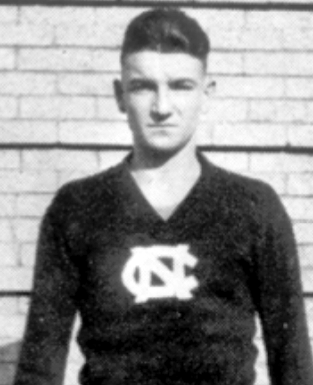
Cartwright Carmichael
In 1921, the school joined the Southern Conference.[23] Overall, the Tar Heels played 32 seasons in the Southern Conference from 1921 to 1953. During that period they won 304 games and lost 111 for a winning percentage of 73.3%. The Tar Heels won the Southern Conference regular season 9 times and the Southern Conference Tournament Championship 8 times.
The team played in the Bynum Gymnasium, a venue known for its unusual running track suspended above the court.[24] Play moved to the Tin Can during the 1924 season, until the team's relocation to the Woollen Gymnasium in 1938.[25][26] Rudimentarily built of steel, attempts to heat the Tin Can during early season at first failed, with ice often forming inside:
The 1922 Tar Heels won the SoCon, and the 1924 Tar Heels squad went 26–0, and was retroactively awarded a 'national championship' by the Helms Athletic Foundation in 1943 and later by the Premo-Porretta Power Poll.[2][27] The Tar Heels also won the 1925 and 1926 SoCon titles, three in a row and four in five seasons. Their fast style of play and stingy defense earned these teams the nickname "White Phantoms", used as an alternative nickname for the Tar Heels into the 1940s.
The 1922 and 1924 teams also included center and guard Cartwright Carmichael and guard Monk McDonald, with the Tar Heels led by forward Jack Cobb from 1924-26. Carmichael was the first Tar Heel to be selected All-American in any sport in 1923, and was again selected in 1924. Cobb was selected All-American in 1924, 1925, and 1926, and was player of the year in 1926. McDonald coached the 1925 team, with Bunn Hackney replacing him at guard.
Frank McGuire (1953–1961)
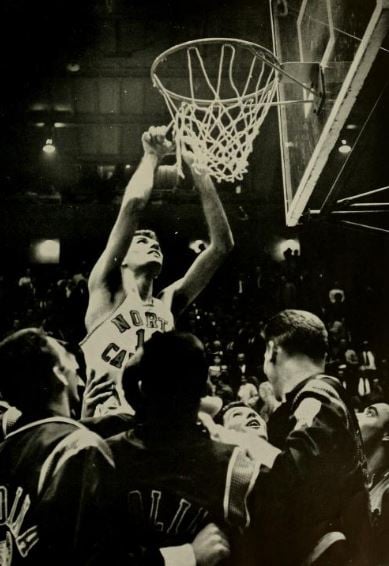
The Tar Heels' Lennie Rosenbluth cuts down the nets after winning the 1957 title.
In 1953, North Carolina split from the Southern Conference and became a founding member of the Atlantic Coast Conference.[28] The Tar Heels won their first NCAA Championship in 1957 under fifth year head coach Frank McGuire, who led an undefeated 32-0 squad dominated by Lennie Rosenbluth and several other transplants from the New York City area to a 54-53 triple overtime victory over Wilt Chamberlain's Kansas Jayhawks. C.D. Chesley, a Washington, D.C. television producer, piped the 1957 championship game in Kansas City to a hastily created network of five stations across North Carolina—the ancestor to the current syndicated ACC football and basketball package from Raycom Sports—which helped prove pivotal in basketball becoming a craze in the state.[29] The title game was the only triple overtime final game in championship history,[30] which followed a triple overtime North Carolina defeat of Michigan State 74-70 the previous night.
In 1960, the Tar Heels were placed on NCAA probation for "improper recruiting entertainment" of basketball prospects. As a result, they were barred from the 1961 NCAA tournament[31] and also withdrew from the 1961 ACC Tournament. Following the season, Chancellor William Aycock forced McGuire to resign. As a replacement, Aycock selected one of McGuire's assistants, Kansas alumnus Dean Smith.
Dean Smith (1961–1997)
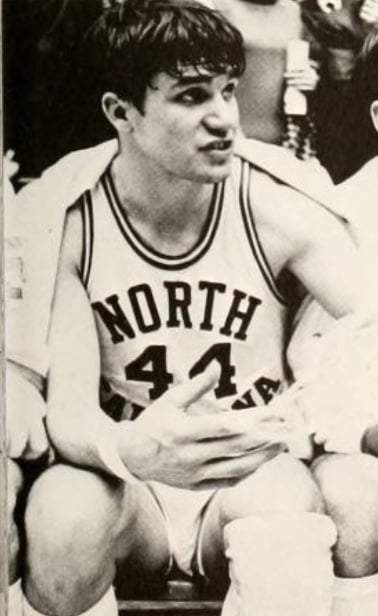
Larry Miller led UNC to Final Four appearances in 1967 and 1968.
Smith's early teams were not nearly as successful as McGuire's had been. His first team went only 8–9–as it turned out, the last losing season UNC would suffer for 41 years. His first five teams never won more than 16 games. This grated on a fan base used to winning; in 1965 some of them even hanged him in effigy. However, Smith would go on to take the Tar Heels to a reign of championships and national dominance.[32] When he retired in 1997, Smith's 879 wins were the most ever for any NCAA Division I men's basketball coach, and his 77.61% winning percentage ninth best.[33] During his tenure, North Carolina won or shared 17 ACC regular season titles and won 13 ACC Tournaments. They went to the NCAA tournament 27 times–including 23 in a row from 1975 to 1997–appeared in 11 Final Fours, and won NCAA national tournament titles in 1982 and 1993. They also won the NIT in 1971.[34] The 1982 National Championship team was led by James Worthy, Sam Perkins, and a young Michael Jordan. The 1993 National Championship team starred Donald Williams, George Lynch and Eric Montross. While at North Carolina, Smith helped promote desegregation by recruiting the University's first African American scholarship basketball player Charlie Scott.[35]
Bill Guthridge (1997–2000)
Smith unexpectedly retired before the start of practice for the 1997–98 season. He was succeeded by Bill Guthridge, who had been an assistant coach at the school for 30 years, the last 25 as Smith's top assistant. During Guthridge's three seasons as head coach he posted an 80–28 record, making him tied for the then-NCAA record for most wins by a coach after three seasons.[36] The Tar Heels reached the NCAA Final Four twice, in the 1998 tournament and again in the 2000 tournament. North Carolina reached the Final Four in 2000 as an 8-seed, their lowest seeding in a Final Four appearance.[37]
Matt Doherty (2000–2003)
Guthridge retired in 2000 and North Carolina turned to Matt Doherty, the head coach at Notre Dame and a player on the 1982 championship team, to lead the Tar Heels.[38] Doherty had little success while at North Carolina. In his first season, the Heels were ranked #1 in the polls in the middle of the Atlantic Coast Conference schedule and finished with a 26–7 record. The bottom fell out the following year, as the Tar Heels finished the season with a record of 8–20, the worst season in school history. They missed postseason play entirely for the first time since the 1965–66 season (including a record 27 straight NCAA Tournament appearances) and finished with a losing record for the first time since 1962 (Dean Smith's first year as coach). They also finished 4–12 in the ACC—only the program's second losing ACC record ever. The 12 losses were six more than the Tar Heels had ever suffered in a single season of ACC play, and placed them in a tie for 7th place—the program's first finish below fourth place ever. The season also saw the end of UNC's run of 31 straight 20-win seasons and 35 straight seasons of finishing third or higher in the ACC.
After bringing in one of the top 5 incoming classes for the 2002–2003 season, the Tar Heels started the season by knocking off a top 5 Kansas team and going on to win the Preseason NIT and returning to the AP top 25. North Carolina went on to finish the season 17–15, but a 6-10 record in ACC play kept them out of the NCAA Tournament. Doherty led the Tar Heels to the third round of the NIT, where they ended their season with a loss to Georgetown.
Roy Williams (2003–present)
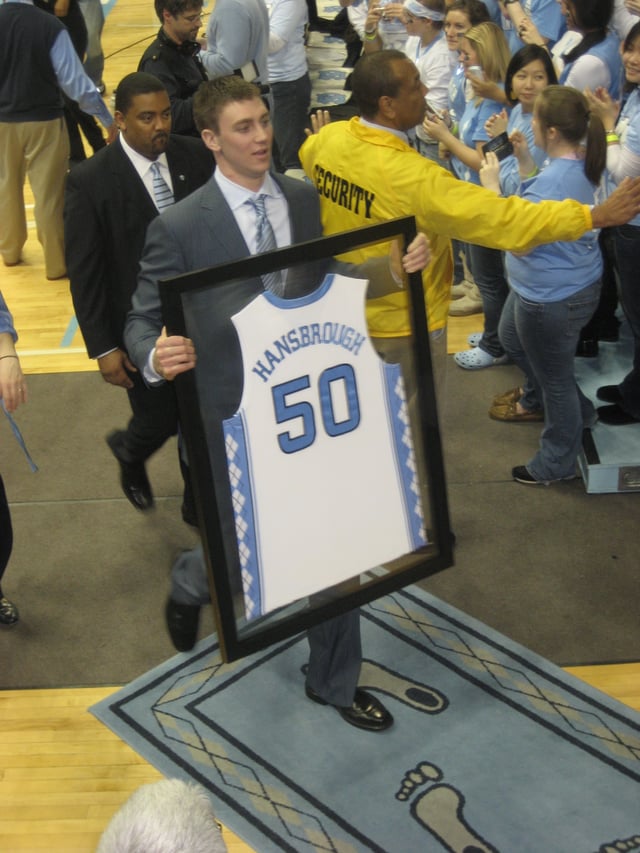
Tyler Hansbrough became the ACC's all-time leading scorer in 2009.
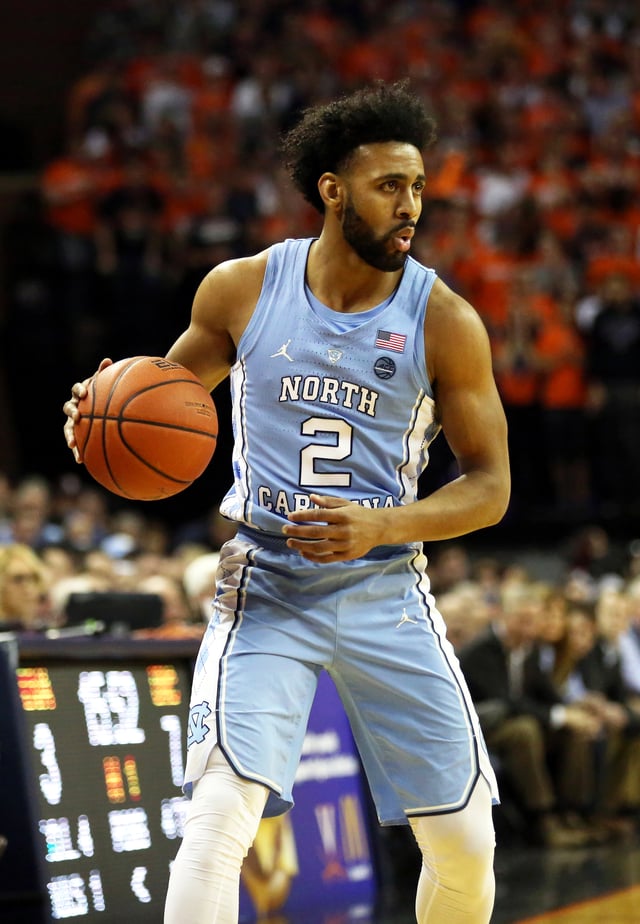
Joel Berry II scored 20+ points in consecutive national title games in 2016 and 2017.
Despite the turnaround from the year before and the NIT appearance, at the end of the season Matt Doherty was replaced as head coach by Roy Williams. Williams had served as an assistant to Smith for 11 years before leaving to spend the first 15 years of his Hall of Fame head coaching career leading Kansas to 9 conference regular season championships and four Final Fours before Smith convinced him to return home. It was hoped that Williams would restore a measure of stability to the program. Williams was UNC's third coach in six years. The two previous to Guthridge (McGuire and Smith) had covered a 45-year period.
In Williams' first season, the Tar Heels finished 19–11 and were ranked in a final media poll for the first time in three years. They returned to the NCAA tournament and were ousted in the second round by Texas. The following year, the Tar Heels won their fourth NCAA title and Williams' first as a head coach.[39] After winning the championship, Williams lost his top seven scorers, but the 2005–06 season saw the arrival of freshman Tyler Hansbrough and Williams was named Coach of the Year. The Tar Heels swept the ACC regular season and tournament titles in 2007 and 2008. The 2008 ACC Tournament was the first time North Carolina has ever won the ACC Tournament without defeating at least one in-state rival during the tournament.[40] North Carolina lost in the national semifinals of the 2008 NCAA tournament to Williams' former program Kansas.
In the 2008–09 season, the Tar Heels won their fifth NCAA title by defeating Michigan State in the championship of the 2009 NCAA Men's Basketball Tournament. The Tar Heels won all six of that year's tournament games by at least 12 points, for an average victory margin of 20.2 points, and only trailed for a total of 10 minutes out of 240 through the entire tournament.[41] Wayne Ellington was named the tournament's Most Outstanding Player, the fourth Tar Heel so honored.
The 2009–2010 Tar Heels struggled throughout the regular season finishing with a 16–15 record,[42] and dropped to #3 in Division I in all-time wins. They later lost in the first round of the ACC Tournament, playing in the first "play-in" Thursday game for the first time since the ACC grew to 12 teams. The Tar Heels did not receive an NCAA tournament bid, and instead accepted a bid to the NIT.[43] During the season, the Tar Heels reached the 2,000-win milestone with a home win over Miami on March 2, 2010, becoming the second fastest college team to do so (North Carolina was in its 100th season of basketball at the time of this accomplishment). The Tar Heels were able to make it to the final game of the NIT, losing to Dayton in the final game finishing with a 20-17 record.
The 2010–2011 Tar Heels, with the addition of Harrison Barnes, Kendall Marshall, and Reggie Bullock, eighth in the preseason polls, struggled out the gates, starting with a 2-2 record, the worst start since the 2001–02 season. After losses to Illinois and Texas, the Tar Heels fell out of the rankings. The losses of senior Will Graves, to dismissal, and Larry Drew II, to transfer and also the unexpected off-season transfers of David and Travis Wear did not help matters. However, the Tar Heels improved greatly during the conference season, finishing first in the ACC regular season with a 14-2 record. Williams was named Conference Coach of the Year for his efforts of getting his team to work through the adversity to finish strong in the regular season.[44] Also during the season, the term Tar Heel Blue Steel was coined, referencing the Tar Heel men's basketball walk-ons. The term was started by one of the players, Stewart Cooper, in hopes that it would be a replacement for "walk-ons" and other less catchy names and soon enough Roy Williams caught on, as well as the rest of the Tar Heel Nation. North Carolina lost to Duke in the ACC Tournament Finals and made a significant run in the NCAA Tournament until they were eliminated in the Elite Eight by Kentucky, finishing with a 29-8 record.[45]
The 2011–2012 Tar Heels finished the regular season with a final record of 32-6, including a 14–2 record in ACC regular season play which allowed the team to win the conference regular season championship outright. The team fell to Florida State in the championship game of the 2012 ACC Men's Basketball Tournament. The team was a #1 seed in the Midwest Regional of the 2012 NCAA Men's Division I Basketball Tournament; the team reached the Elite Eight and was defeated by Kansas 80-67. This defeat was the second time UNC lost to Kansas in the NCAA Tournament with Roy Williams as UNC head coach. He previously coached Kansas from 1988 to 2003. The loss to Kansas was also UNC's second straight loss in the Elite Eight, after losing to Kentucky the year before. Kansas later fell to Kentucky 67-59 in the National Championship Game. Before the Kansas game, the Tar Heels won their previous three games in the NCAA Tournament by an average of 13.7 points. In the second-round game versus Creighton, starting UNC point guard Kendall Marshall broke his right wrist with 10:56 remaining[46] in the second half with UNC leading 66-50. Marshall continued to play by dribbling primarily with his left hand, including getting fouled on a drive to the basket with 7:09 left in the second half. He left the game against Creighton with two minutes left with UNC leading 85-69. Williams announced Kendall Marshall's injury at the Creighton post-game press conference.[47] Kendall Marshall did not play in UNC's two following games in the NCAA Tournament, a 73-65 overtime win over Ohio in the Sweet 16 and the aforementioned 67-80 loss to Kansas in the Elite Eight.
With the departures of several stars from the 2012 team, The Tar Heels would begin a slow climb back to the top following the Elite Eight loss. The 2012-13 season ended with a disappointing loss to Kansas in the tournament for the second year in a row. In 2013-14, the Tar Heels became the only team in men's college basketball history to beat every team ranked in the top 4 in the preseason.[48] The Tar Heels would finish 24-10 that year, ending the year in heartbreak by losing to Iowa State in the final seconds of the Round of 32. The 2014-15 team would improve, finishing the year 4th in the ACC Standings that year and advanced to the Sweet 16, where they would lose to the Wisconsin Badgers. It was also the year that North Carolina would recruit Joel Berry II and Justin Jackson, who were both key contributors to the 2017 National Championship squad.
In 2015-2016, led by seniors Marcus Paige and Brice Johnson, the Tar Heels earned their 30th ACC regular season title, 18th ACC tournament title, and 19th Final Four.[49] They also appeared in their 10th NCAA title game, in which they lost on a buzzer beater to Villanova, despite Marcus Paige's dramatic three-pointer to tie the game with 4.7 seconds left.[50] The Tar Heels finished with a 33-7 overall record and a 14-4 ACC record.
The following year, the Tar Heels were ranked #6 in the AP preseason poll, having lost Paige and Johnson but retaining 2016 ACC Tournament MVP Joel Berry II as well as forwards Kennedy Meeks and Isaiah Hicks. After early season losses to Indiana and Kentucky, the Tar Heels won their 31st ACC regular season title. Despite never being ranked #1 in the AP Poll and losing to Duke in the semifinals of the ACC tournament, the Heels earned a #1 seed in the NCAA tournament, where they advanced to their record 20th Final Four and 11th NCAA tournament title game. They beat Gonzaga 71-65 to give Williams his 3rd national championship, surpassing mentor Dean Smith for most NCAA tournament championships at Carolina, and behind only John Wooden, Mike Krzyzewski, and Adolph Rupp for most NCAA tournament championships overall. Just as in the previous year, the Tar Heels finished with a 33-7 overall record and a 14-4 ACC record.
In 2017-18, the Tar Heels were ranked at #9 in the Coaches poll. Forwards Isaiah Hicks, Kennedy Meeks, Tony Bradley, and Justin Jackson had left, while the team recruited Cameron Johnson. This season, the team did not earn the ACC regular season or postseason title. However, the Heels earned a #2 seed in the West of the NCAA tournament. The Tar Heels ended the season with a 26-11 record after being eliminated by Texas A&M in the round of 32 in the NCAA Tournament.
The Carolina Way
Dean Smith was widely known for his idea of "The Carolina Way," in which he challenged his players to, “Play hard, play smart, play together.”[51] “The Carolina Way” was an idea of excellence in the classroom, as well as on the court. In Coach Smith's book, The Carolina Way, former player Scott Williams said, regarding Dean Smith, “Winning was very important at Carolina, and there was much pressure to win, but Coach cared more about our getting a sound education and turning into good citizens than he did about winning.“ [52] "The Carolina Way" was evident in many practices the players would implement, including pointing to the player who assisted in a basket, giving him credit as a act of selflessness. This "Thank the Passer" practice is used throughout basketball today.[53]
Streaks
The Tar Heels own several notable streaks in the history of college basketball. They appeared in either the NCAA Tournament or National Invitation Tournament (NIT) every year from 1967 to 2001. This includes 27 straight appearances in the NCAA tourney from 1975 (the first year that competition allowed more than one team from a conference to get a guaranteed bid) to 2001—the longest such streak in tournament history until it was broken by Kansas in March 2017. The Tar Heels also notched 37 straight winning seasons from 1964 to 2001, the third-longest such streak in NCAA history, behind UCLA's streak of 54 consecutive winning seasons from 1948 to 2001, and Syracuse's currently active streak of 46 seasons from 1971 to date. They also finished .500 or better for 39 years in a row from 1962 (Dean Smith's second year) to 2001, the third-longest such streak in NCAA history, behind Kentucky's streak of 61 consecutive seasons from 1926 to 1988 (the Wildcats were barred from playing in 1952–53 due to NCAA violations) and UCLA's 54-season streak.
From the ACC's inception in 1953 to 2001, the Tar Heels did not finish worse than a tie for fourth place in ACC play. By comparison, all of the ACC's other charter members finished last at least once in that time. From 1965 to 2001, they did not finish worse than a tie for third, and for the first 21 of those years they did not finish worse than a tie for second.
All of these streaks ended in the 2001–02 season, when the Tar Heels finished 8–20 on the season under coach Matt Doherty. They also finished tied for 7th in conference play, behind Florida State and Clemson—only their second losing conference record ever (the first being in the ACC's inaugural season).
Additionally, the Tar Heels are 59-0 all-time in home games played against the Clemson Tigers (the NCAA record for the longest home winning streak against a single opponent).[54] Until the 2010 ACC Tournament, North Carolina was the only program to have never played a Thursday game in the ACC Tournament since it expanded to a four-day format.
By the numbers
All Time Wins- 2,206[55]
All Time Winning Percentage- .738[55]
NCAA Championships- 6[55]
NCAA Tournament Runner Up- 5[55]
All Americans- 49 players chosen 78 times[55]
ACC Tournament Titles- 18[55]
NCAA Championship Games- 11[56]
NCAA Final Fours- 20 (This is the most Final Four appearances of all time)[56]
NCAA Tournament Appearances- 48[56]
NCAA Tournament Wins- 123[56]
#1 Seeds in the NCAA Tournament- 16[56]
Number of Weeks Ranked All Time in the Top-25 of the AP Poll- 915[57]
Number of Times Defeating the #1 Ranked Team in the Country- 14[57]
Victories over AP Number 1 team
January 14, 1959 - UNC 72, No. 1 NC State 68
January 12, 1980 - No. 15 UNC 82, No. 1 Duke 67
November 21, 1987 - UNC 96, No. 1 Syracuse 93
January 18, 1989 - No. 13 UNC 91, No. 1 Duke 71
March 17, 1990 - NR UNC 79, No. 1 Oklahoma, 77
February 5, 1992 - No. 9 UNC 75, No. 1 Duke 73
February 3, 1994 - No. 2 UNC 89, No. 1 Duke 78
February 5, 1998 - No. 2 UNC 97, No. 1 Duke 73
March 8, 1998 - UNC 83, No. 1 Duke 68
January 17, 2004 - UNC 86, No. 1 Connecticut 83
April 4, 2005 - No. 2 UNC 75, No. 1 Illinois 70
March 4, 2006 - No. 13 UNC 83, No. 1 Duke 76
December 4, 2013 - NR UNC 79, No. 1 Michigan State 65
February 20, 2019 - No. 8 UNC 88, No. 1 Duke 72
Honored and retired jerseys
Retired numbers
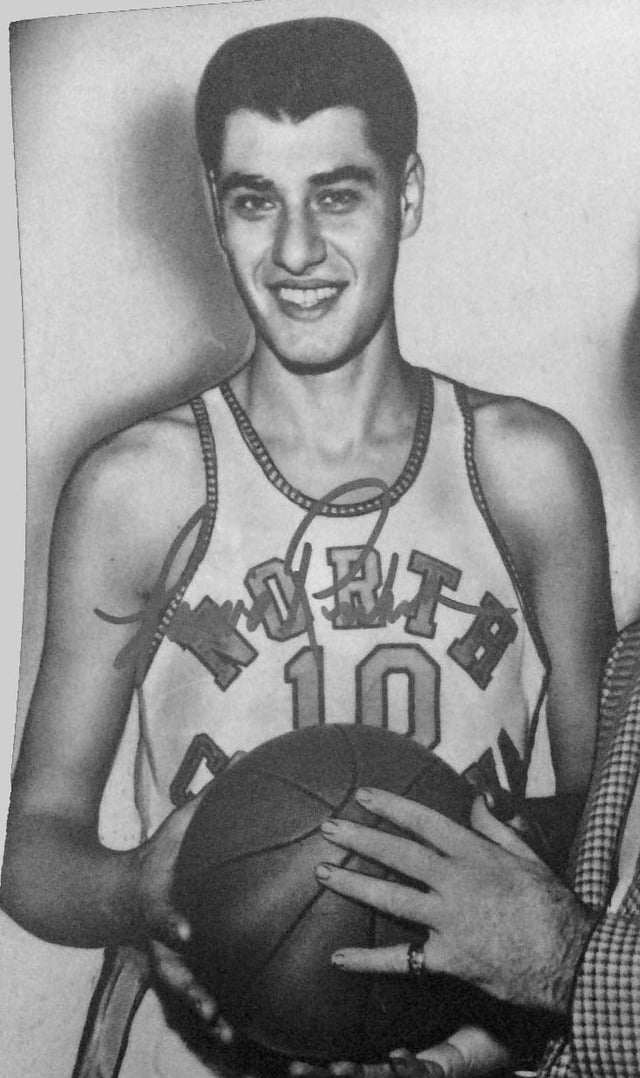
Lennie Rosenbluth
To have his number retired, a player must win one of the following six widely recognized player of the year awards:[62]
Associated Press Player of the Year
Oscar Robertson Trophy, formerly known as the United States Basketball Writers Association National Player of the Year
National Association of Basketball Coaches Player of the Year
Sporting News Player of the Year
John R. Wooden Award
Naismith College Player of the Year
Eight players (including Jack Cobb, whose jersey did not have a number) have had their numbers retired. Tyler Hansbrough's number 50 is the eighth to be retired, after he won all six major player of the year awards during the 2007–08 season.[63]
| North Carolina Tar Heels retired numbers[64] | ||||
| No. | Player | Position | Tenure | |
|---|---|---|---|---|
| 10 | Lennie Rosenbluth | SF | 1954–57 | |
| 12 | Phil Ford | PG | 1974–78 | |
| 20 | George Glamack | F | 1938–41 | |
| 23 | Michael Jordan | SG | 1981–84 | |
| 33 | Antawn Jamison | F | 1995–98 | |
| 50 | Tyler Hansbrough | PF, C | 2005–09 | |
| 52 | James Worthy | SF | 1979–82 | |
| Jack Cobb | F | 1923–26 | ||
49 former North Carolina men's basketball players are honored in the Smith Center with banners representing their numbers hung from the rafters. Of the 49 honored jerseys, eight are retired.
Honored jerseys
To have his jersey honored, a player must have met one of the following criteria:[67]
MVP of a National Championship-winning team
Member of a gold medal-winning Olympic team
First- or second-team All-America
ACC Player of the Year
NCAA Tournament MOP
Notable players and coaches
Tar Heels inducted into the Naismith Memorial Basketball Hall of Fame
To date eleven Tar Heels have been inducted into the Basketball Hall of Fame
| Year | Player(s) | Inducted As a |
|---|---|---|
| 1970 | Ben Carnevale | Coach |
| 1977 | Frank McGuire | Coach |
| 1983 | Dean Smith | Coach |
| 1986 | Billy Cunningham | Player |
| 2000 | Bob McAdoo | Player |
| 2002 | Larry Brown | Coach |
| 2003 | James Worthy | Player |
| 2007 | Roy Williams | Coach |
| 2009 | Michael Jordan | Player |
| 2018 | Charlie Scott | Player |
| 2019 | Bobby Jones | Player |
Tar Heels in the Olympics
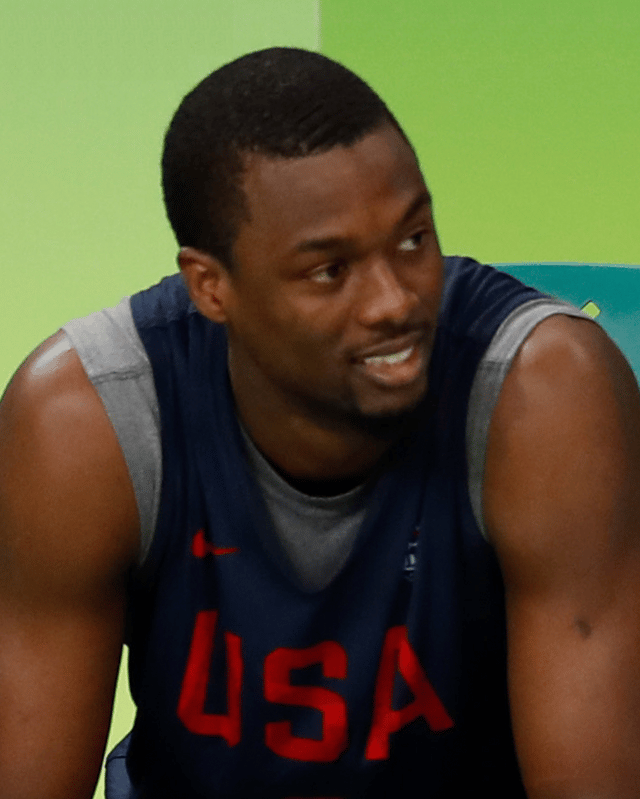
Harrison Barnes played for the 2016 U.S. Olympic team.
| Year | Tar Heel | As a | Country |
|---|---|---|---|
| 1964 | Larry Brown | Player | |
| 1968 | Charles Scott | Player | |
| 1972 | Bobby Jones | Player | |
| 1976 | Walter Davis | Player | |
| 1976 | Phil Ford | Player | |
| 1976 | Bill Guthridge | Asst. Coach | |
| 1976 | Mitch Kupchak | Player | |
| 1976 | Tommy LaGarde | Player | |
| 1976 | Dean Smith | Head Coach | |
| 1980 | Al Wood | Player | |
| 1984 | Michael Jordan | Player | |
| 1984 | Sam Perkins | Player | |
| 1988 | J.R. Reid | Player | |
| 1992 | Michael Jordan | Player | |
| 1992 | Henrik Rödl | Player | |
| 2000 | Vince Carter | Player | |
| 2000 | Larry Brown | Asst. Coach | |
| 2004 | Larry Brown | Head Coach | |
| 2004 | Roy Williams | Asst. Coach | |
| 2016 | Harrison Barnes | Player |
McDonald's All-Americans
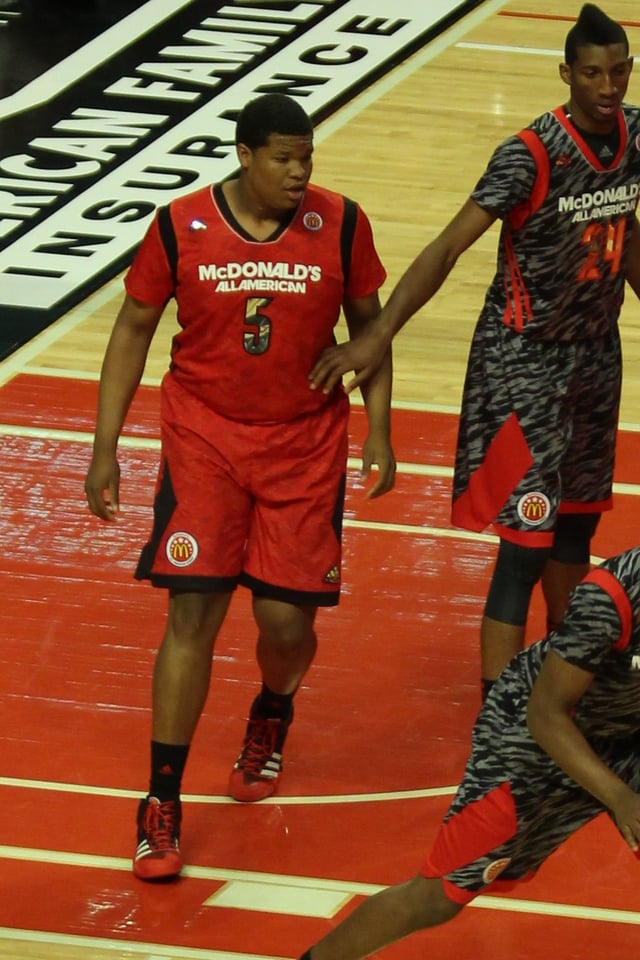
Kennedy Meeks as a 2013 McDonald's All-American.
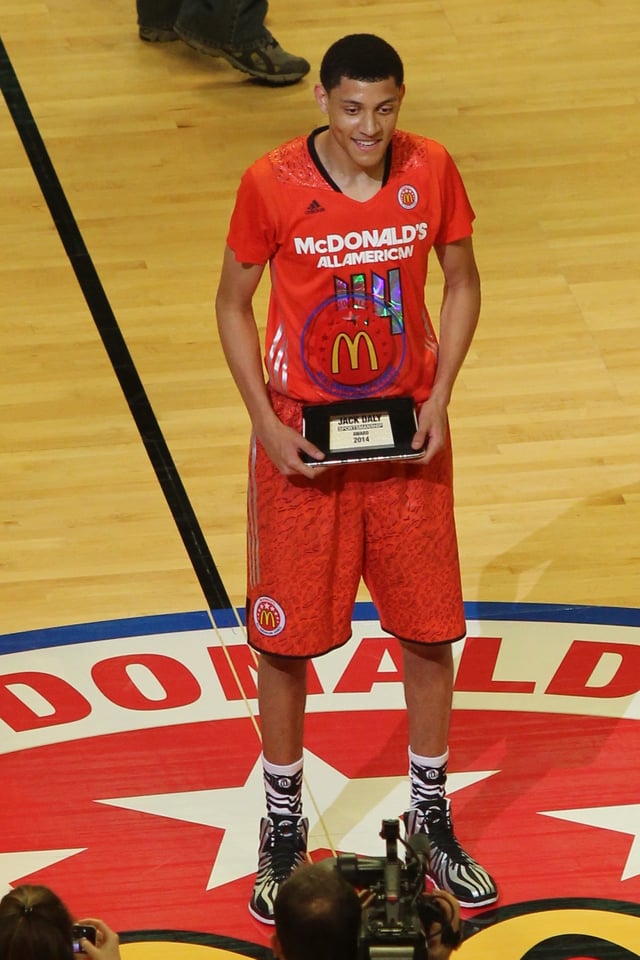
Justin Jackson accepting the MVP award for the 2014 game.
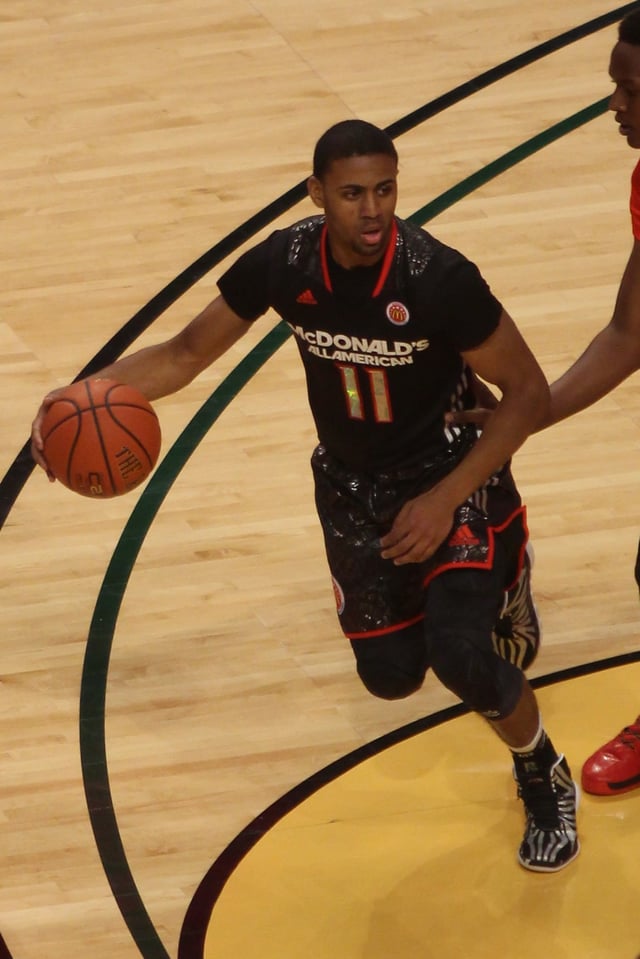
Joel Berry from the 2014 game.
The following 74 McDonald's All-Americans have played for North Carolina:[68]
| Year | Player | Hometown |
|---|---|---|
| 1977 | Pete Budko | Lutherville, MD |
| 1977 | Al Wood | Gray, GA |
| 1979 | James Worthy | Gastonia, NC |
| 1979 | Jim Braddock | Chattanooga, TN |
| 1980 | Matt Doherty | East Meadow, NY |
| 1980 | Sam Perkins | Latham, NY |
| 1981 | Buzz Peterson | Asheville, NC |
| 1981 | Michael Jordan | Wilmington, NC |
| 1982 | Brad Daugherty | Black Mountain, NC |
| 1982 | Curtis Hunter | Durham, NC |
| 1983 | Kenny Smith | Queens, NY |
| 1983 | Dave Popson | Ashley, PA |
| 1983 | Joe Wolf | Kohler, WI |
| 1985 | Jeff Lebo | Carlisle, PA |
| 1985 | Kevin Madden | Staunton, VA |
| 1986 | Steve Bucknall | London, GB |
| 1986 | Pete Chilcutt | Eutaw, AL |
| 1986 | Scott Williams | Hacienda Heights, CA |
| 1986 | J.R. Reid | Virginia Beach, VA |
| 1987 | King Rice | Binghamton, NY |
| 1989 | Matt Wenstrom | Katy, TX |
| 1989 | George Lynch | Roanoke, VA |
| 1990 | Eric Montross | Indianapolis, IN |
| 1990 | Brian Reese | The Bronx, NY |
| 1990 | Derrick Phelps | Pleasantville, NY |
| 1991 | Donald Williams | Garner, NC |
| 1992 | Serge Zwikker | Maassluis, NL |
| 1993 | Jerry Stackhouse | Kinston, NC |
| 1993 | Rasheed Wallace | Philadelphia, PA |
| 1993 | Jeff McInnis | Charlotte, NC |
| 1995 | Antawn Jamison | Charlotte, NC |
| 1995 | Vince Carter | Daytona Beach, FL |
| 1996 | Ed Cota | Brooklyn, NY |
| 1996 | Vasco Evtimov | Sofia, BG |
| 1997 | Brendan Haywood | Greensboro, NC |
| 1998 | Ronald Curry | Hampton, VA |
| 1998 | Jason Capel | Chesapeake, VA |
| 1998 | Kris Lang | Gastonia, NC |
| 1999 | Joseph Forte | Greenbelt, MD |
| 2000 | Neil Fingleton | Durham, UK |
| 2001 | Jawad Williams | Cleveland, OH |
| 2002 | Rashad McCants | Asheville, NC |
| 2002 | Sean May | Bloomington, IN |
| 2002 | Raymond Felton | Latta, SC |
| 2004 | Marvin Williams | Bremerton, WA |
| 2005 | Tyler Hansbrough | Poplar Bluff, MO |
| 2005 | Danny Green | North Babylon, NY |
| 2005 | Bobby Frasor | Blue Island, IL |
| 2006 | Brandan Wright | Brentwood, TN |
| 2006 | Ty Lawson | Clinton, MD |
| 2006 | Wayne Ellington | Wynnewood, PA |
| 2008 | Larry Drew II | Woodland Hills, CA -Transferred to UCLA |
| 2008 | Ed Davis | Richmond, VA |
| 2008 | Tyler Zeller | Washington, IN |
| 2009 | David Wear | Santa Ana, CA -Transferred to UCLA |
| 2009 | Travis Wear | Santa Ana, CA -Transferred to UCLA |
| 2009 | Dexter Strickland | Elizabeth, NJ |
| 2009 | John Henson | Tampa, FL |
| 2010 | Kendall Marshall | Dumfries, VA |
| 2010 | Reggie Bullock | Kinston, NC |
| 2010 | Harrison Barnes | Ames, IA |
| 2011 | James Michael McAdoo | Norfolk, VA |
| 2011 | P. J. Hairston | Greensboro, NC |
| 2012 | Marcus Paige | Marion, IA |
| 2013 | Kennedy Meeks | Charlotte, NC |
| 2013 | Isaiah Hicks | Oxford, NC |
| 2014 | Justin Jackson | Tomball, TX |
| 2014 | Joel Berry II | Apopka, FL |
| 2014 | Theo Pinson | Greensboro, N.C. |
| 2016 | Tony Bradley | Bartow, FL |
| 2018 | Coby White | Wilson, NC |
| 2018 | Nassir Little | Orlando, FL |
| 2019 | Cole Anthony | Briarwood, NY |
| 2019 | Armando Bacot | Richmond, VA |
Mr. Basketball
The following players won their state's Mr. Basketball award in high school.
| Year | Player | State | Notes |
|---|---|---|---|
| 1973 | Tom LaGarde | Michigan | |
| 1976 | Dave Colescott | Indiana | |
| 1983 | Joe Wolf | Wisconsin | |
| 1986 | Scott Williams | California | |
| 1987 | Henrik Rodl | North Carolina | |
| 1987 | King Rice | New York | |
| 1990 | Clifford Rozier | Florida | Transferred to Louisville |
| 1991 | Larry Davis | South Carolina | |
| 1991 | Donald Williams | North Carolina | |
| 1995 | Vince Carter | Florida | |
| 1995 | Antawn Jamison | North Carolina | |
| 1998 | Kris Lang | North Carolina | |
| 2000 | Adam Boone | Minnesota | Transferred to Minnesota |
| 2002 | Raymond Felton | South Carolina | |
| 2002 | Sean May | Indiana | |
| 2004 2005 2006 | Brandan Wright | Tennessee | Div. II A |
| 2005 | Tyler Hansbrough | Missouri | |
| 2006 | Will Graves | North Carolina | |
| 2008 2009 | Leslie McDonald | Tennessee | Div. II AA |
| 2008 | Tyler Zeller | Indiana | |
| 2010 | Reggie Bullock | North Carolina | |
| 2010 | Harrison Barnes | Iowa | |
| 2012 | Marcus Paige | Iowa | |
| 2012 | Brice Johnson | South Carolina | |
| 2012 2013 2014 | Joel Berry II | Florida | |
| 2013 | Isaiah Hicks | North Carolina | |
| 2014 | Theo Pinson | North Carolina | |
| 2016 | Tony Bradley | Florida | |
| 2016 | Seventh Woods | South Carolina | |
| 2017 | Jalek Felton | South Carolina | |
| 2018 | Coby White | North Carolina | |
| 2018 | Nassir Little | Florida |
Current players in the NBA
Harrison Barnes, Sacramento Kings
Tony Bradley, Utah Jazz
Reggie Bullock, New York Knicks
Vince Carter, Atlanta Hawks
Ed Davis, Utah Jazz
Wayne Ellington, New York Knicks
Raymond Felton, Oklahoma City Thunder
Danny Green, Los Angeles Lakers
John Henson, Cleveland Cavaliers
Isaiah Hicks, Charlotte Hornets
Justin Jackson, Dallas Mavericks
Cameron Johnson, Phoenix Suns
Nassir Little, Portland Trail Blazers
Theo Pinson, Brooklyn Nets
Coby White, Chicago Bulls
Marvin Williams, Charlotte Hornets
NBA coaches and executives
Larry Brown, former head coach of the Charlotte Bobcats, New York Knicks, Detroit Pistons, Philadelphia 76ers, Indiana Pacers, Los Angeles Clippers, San Antonio Spurs, New Jersey Nets, Denver Nuggets
Billy Cunningham, former head coach of the Philadelphia 76ers, former part owner of Miami Heat
Walter Davis, former advance scout for the Washington Wizards
Phil Ford, former assistant coach of the Detroit Pistons, New York Knicks, Charlotte Bobcats
Michael Jordan, owner and chairman of the Charlotte Hornets, former part owner and president of basketball operations of the Washington Wizards, former managing member of basketball operations of the Charlotte Bobcats
George Karl, former head coach of the Sacramento Kings, Denver Nuggets, Milwaukee Bucks, Seattle SuperSonics, Golden State Warriors, Cleveland Cavaliers
John Kuester, advance scout for the Los Angeles Lakers, former head coach of the Detroit Pistons
Mitch Kupchak, general manager of the Charlotte Hornets, former general manager of the Los Angeles Lakers
Bob McAdoo, former assistant coach of the Miami Heat
Doug Moe, former head coach of the Philadelphia 76ers, Denver Nuggets, San Antonio Spurs
Mike O'Koren, former assistant coach of the New Jersey Nets, Washington Wizards, Philadelphia 76ers
Sam Perkins, former vice president of player relations for the Indiana Pacers
Buzz Peterson, assistant general manager of the Charlotte Hornets
Jerry Stackhouse, head coach of Vanderbilt University
Rasheed Wallace, former assistant coach of the Detroit Pistons
Joe Wolf, head coach of the Greensboro Swarm
Other fields
James Delany, commissioner of the Big Ten Conference (1967–1970)
Julius Peppers, Defensive End for the Carolina Panthers (2017–present)
Ronald Curry, former Wide Receiver for the Oakland Raiders (2002-2008)
Richard Vinroot, former mayor of Charlotte, North Carolina (1961–1963)
Brad Daugherty, ESPN and NASCAR television analyst and part-owner of JTG Daugherty Racing NASCAR race team (2008–Present)
Brendan Haywood, college basketball announcer for CBS Sports
Antawn Jamison, analyst for Time Warner Cable SportsNet.
Rivalries
Traditional rivalries
| Team | UNC Record | First Meeting | Notes |
|---|---|---|---|
| Duke | 139–112 | 1920 | Carolina–Duke rivalry |
| NC State | 158–78 | 1913 | North Carolina–NC State rivalry |
| Wake Forest | 161–66 | 1911 | North Carolina–Wake Forest rivalry |
Other major programs
UNC alumni defeated UCLA alumni 116-111 in an exhibition game in Los Angeles, CA on June 29, 1987.[72]
Carolina Basketball Museum
The Carolina Basketball Museum[73][74] is located in the Ernie Williamson Athletics Center and contains 8,000 square feet.[75] It was built to replace the old memorabilia room in the Dean Smith Center.[75] Designed by Gallagher & Associates, the cost of construction was $3.4 million.[75] The museum opened in January 2008.[76][77]
UNC junior varsity basketball team
The UNC junior varsity basketball team was originally used at North Carolina as freshmen teams because freshmen were not allowed to play on the varsity team until the NCAA granted freshmen eligibility in the Fall of 1972.
After most schools decided to disband their J.V. squads, North Carolina's athletic department opted to keep the team so that non-scholarship students were given the chance to play basketball for UNC. North Carolina also uses their J.V. team as a way for varsity assistant coaches to gain experience as head coaches, such as the current coach, Hubert Davis. Roy Williams was a J.V. coach for eight years before he was hired at Kansas.
Students at UNC are only allowed to play on the team for two years, and then they are given a chance to try out for the varsity. The J.V. team also serves as a way for coaches to evaluate players for two years on the J.V. so they will better know what to expect when they try out for varsity later in their careers.
UNC's J.V. team plays a combination of teams from Division II and III schools, some community colleges, and a few prep schools from around the North Carolina area.
Seasons
Records
NCAA Men's Division I Basketball Tournament Consecutive Appearances
Most All time Final Four Appearances
Home venues
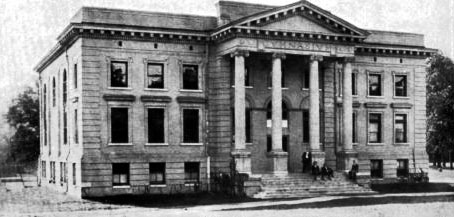
Bynum Gymnasium, the first home of the team
Bynum Gymnasium (1910–1924)
Tin Can (1924–1938)
Woollen Gymnasium (1938–1964)
Carmichael Auditorium (1965–1986)
Dean Smith Center (1986–present)
